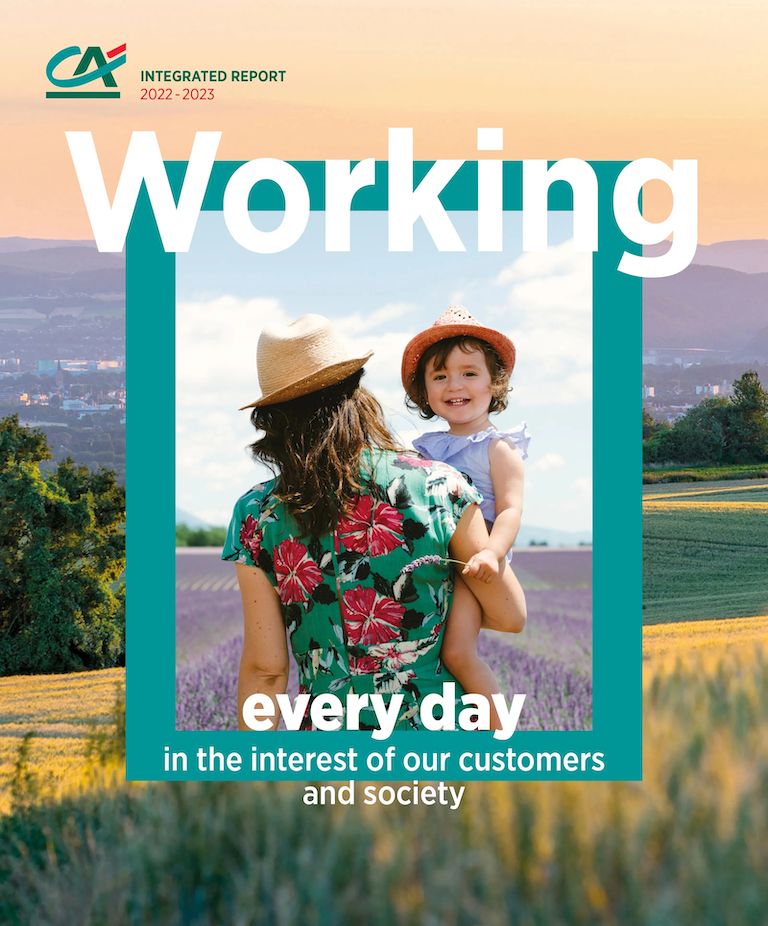A responsible and committed governance
Crédit Agricole S.A.’s governance balances the interests of the customers of all the entities comprising the Group, societal issues and the respect for the mutual values that form the basis of the identity of Crédit Agricole Group.
Composition of the Board of Directors
A highly mobilised Board
In 2022, much of the Board’s work focused on the economic effects of inflation and rising interest rates and the consequences of the war in Ukraine, starting with the situation faced by CA Ukraine employees. The Board also laid out the guidelines of the new strategic plan for 2025, the priority of which is to increase support to customers in their transition to a low-carbon economy and a more digital world.
Relying on the Group’s financial strength and the resilience of its financial performance, the Board’s actions were guided by a desire to support the Group’s customers and continue to contribute to their projects, to increase profitability in the service of shareholders, and so to secure the economy. The Board paid particular attention to the risks associated with the war in Ukraine, pressures in the commodities and energy markets and the consequences of inflation and higher interest rates for the economy and the Group’s customers. It also continued to pursue its strategy and stepped up its support for a decarbonised economy and the energy transition.
In this regard, it approved the Medium-Term Plan (MTP), “Ambitions 2025”, of Crédit Agricole S.A., which is based on the pursuit of digital transformation and human responsibility with the objective of making energy transitions accessible to all, accelerating the emergence of renewable energies, and facilitating access to healthcare and healthy ageing.
Against this backdrop, the ongoing discussions between the Board and Executive Management reflected the same desire on both sides for a new model of prosperity that respects the environment and is adapted to new needs.
The Board approves and sets the strategic guidelines proposed by the Chairman and Chief Executive Officer of Crédit Agricole S.A., authorises the Group’s strategic investments, determines the general principles of internal financial organisation and supervises the Group’s operations, most notably as regards risk.
The Board held 12 plenary meetings in 2022, including two strategic seminars, the first held on 18 January 2022, dedicated to major issues in payments, and the second on 2 June, dedicated to the “Ambitions 2025” MTP. The Risk Committee met 17 times, with 10 of those meetings held jointly with the Audit Committee.

The Board of Directors
-
The Board approves and sets the Group’s strategic guidelines proposed by the Chairman and Chief Executive Officer of Crédit Agricole S.A., authorises strategic investments, determines the general principles of internal financial organisation and supervises the Group’s operations, most notably as regards risk.
21 members
12 meetings
96% attendance
-
Oversees the financial statement preparation process.
6 members
5 meetings
100% attendance
1 Independent Chairwoman
-
9 members
10 meetings
99% attendance
2 Independent Chairwomen
-
Reviews the Group’s risk management strategy, including financial and operational risks.
5 members
7 meetings
95% attendance
1 Independent Chairwoman
-
Monitors risk related to activities conducted directly by the Group’s entities in the United States.
3 members
4 meetings
100% attendance
1 Independent Chairwoman
-
Proposes compensation policies to the Board and ensures their compliance.
6 members
8 meetings
98% attendance
1 Independent Chairwoman
-
Enhances the Group’s strategic thinking on growth, investments and CSR.
8 members
4 meetings
89% attendance
1 Chair: Chairman of the Board of Directors
-
Proposes or issues opinions on appointments and corporate officers.
6 members
5 meetings
100% attendance
1 Independent Chairwoman
Crédit Agricole S.A. Executive Committee
As the main executive body of Crédit Agricole S.A., the Executive Committee implements the strategy and directs the Group’s activity. It meets twice a month.
Compliance useful to society
Through its medium-term Smart Compliance for Society project, the Compliance business line reaffirms its desire to implement regulations operationally and to promote an ethical culture within the Group. It expresses and implements this commitment through three vectors of usefulness and six goals that are fully in line with Crédit Agricole Group’s Raison d’Être and Project.
-
Useful to society
- Preventing and combating financial crime is an essential investment in order to comply with international sanctions and to combat money laundering, terrorist financing, fraud and market abuses.
- Working towards sustainable finance that respects the Group’s social commitments, by further developing an ethical approach that complements adherence to regulations, with the aim of preventing and avoiding reputational risks.
-
Useful to its customers
- Contributing to protecting our customers and differentiating ourselves by respecting their legitimate interests and personal data, through a transparent and fair relationship.
- Promoting the simplicity of our customer relationships by natively integrating regulations into the process through an innovative approach using the potential of new technologies.
-
Useful to its customers
- Strengthening the commitment of the business lines through native implementation of the regulations, which encourages compliant development, optimisation of the necessary efforts, and distribution of useful skills in compliance and ethics.
- Empowering the compliance business line teams even more through an operational approach to regulation, encouraging innovation, initiative, skills development and career development.
Promoting a strong ethical culture
As a responsible bank that cares about its customers’ interests, Crédit Agricole Group places the utmost importance on ethics. The Compliance function has rolled out a set of reference documents within the Group which, along with legal and regulatory requirements, cover three prescriptive tiers:
- The Code of Ethics, which was made available to the public in 2017 and is the same for all Group entities, affirms our commitments, our identity and our values of local presence, responsibility and solidarity. It also highlights our principles of action with regard to our stakeholders that must be respected every day through ethical behaviour.
- Codes of Conduct that translate the principles of the Code of Ethics into standards to be applied operationally in a form adapted to the specific nature of each entity’s activities, to guide the actions, decisions and behaviour of each individual on a daily basis.
- The Corpus Fides is a collection of procedures that identify the rules that Group entities, executives and employees must follow, and which reflect compliance-related regulatory changes.
In addition to these provisions, the Group launches regular campaigns in the form of comic strips or videos to remind employees of the tenets of ethical behaviour. Every year the Group also organizes an “Ethics and You” quiz for all employees, who are invited to constantly question themselves on correct behaviour with regard to the values and principles shared within the company and vis-à-vis stakeholders, in line with societal expectations. Ethics set the standard when it comes to decision-making.
Ethical conduct means examining the best practices to be adopted as regards the values and principles shared within the company.
Whistleblowing
Crédit Agricole Group has a whistleblowing system whereby any employee who witnesses an irregularity, an offence or a crime within their entity can report it and benefit from the protection provided to whistleblowers. The system guarantees total confidentiality of the information provided as well as anonymity (when this option is chosen by the whistleblower).
A certified anti-corruption system
In October 2022, Crédit Agricole Group obtained the renewal of its ISO 37001 certification for its anti-corruption system. It is the only French international banking group to be so certified. Awarded to Crédit Agricole by Euro Compliance(1) in 2016, this certification recognises the Group’s determination to prevent corruption and the quality of its anti-corruption programme.
It certifies that corruption risks have been identified and analysed and that the programme applied by Crédit Agricole is designed in such a way as to limit these various risks through adherence to international best practices.
ISO 37001 certification covers all of Crédit Agricole Group’s business lines in France and abroad as well as its 145,000 employees and 53 million customers.
(1) Euro Compliance is a certification and training organisation specialising in the fight against corruption.
A constant risk management culture
After a year in 2021 in which risk levels were contained through support measures and economic recovery, 2022 saw a major increase in uncertainties: the Russian-Ukrainian conflict, the return to the fore of inflation, the calling into question of accommodating monetary policies and doubts about growth. Against this backdrop, the cost of risk, a reflection of prudent provisioning, increased while remaining below pre-2020 levels thanks to the quality of the Group’s assets.
Loan loss reserves
Loan loss reserves represent around six years of the historical average cost of risk, 35% of which is related to the provisioning of performing loans for Crédit Agricole S.A., 48% for the Regional Banks, and 42% on average for the entire Crédit Agricole Group.
Coverage ratio(1)
High coverage ratios boosting the Group’s financial strength.
(1) Provisions for performing loans and proven risks/Loans in default
Non-Performing Loans ratio
Well-managed NPL ratio reflecting the quality of our assets and of our customers.
Internal control system
Against a backdrop of overlapping macroeconomic and geopolitical shocks, the Group continued to apply a prudent approach by continuing to fund prudential provisions.
Breakdown of gross outstanding customer loans at Crédit Agricole S.A.(1)
(1) Gross outstanding loans to customers excluding credit institutions as at 31 December 2022.
Major risks
Even though the level of measured risk remains below pre-pandemic levels, the geopolitical context, the return of inflation and the end of accommodating monetary policies all bring about a climate of major uncertainties:
- The global geopolitical context (military conflicts, US/China rivalries, and so on) is likely to further increase the risks for all economic players in the short term.
- As costs rise, particularly energy costs, the ability of some corporates and businesses to meet their high levels of debt could be called into question.
- A persistent high level of inflation and the resulting monetary tightening raise the risk of market correction and a lasting increase in long rates that would weaken sovereign debt.
The euro zone, which is heavily dependent on Russia for energy, is particularly likely to experience a halt in the growth momentum observed since the post-Covid recovery.
Credit risks
Risks of loss from the failure of a counterparty and its resulting inability to meet its commitments.
-
Market risks
Risk of loss arising from changes in market parameters.
VAR (99% – 1 day) mutualised
-
€15m
at end-December 2022 of Crédit Agricole S.A.
Operational risks
Risks of loss resulting from inadequate or failed personnel processes, information systems (including information security and confidentiality, and cyberspace risks for which the vectors are telecommunications systems and resources), or from external events.
Insurance risks
Risks of loss arising from inadequate pricing, incorrect valuation of provisions for claims or inadequate reinsurance.
Compliance and legal risks
Risks arising from failure to comply with regulations and legislation governing banking and financial activities. Risks arising from exposure to civil or criminal legal proceedings.
Provisions for litigation:
-
€546m
Crédit Agricole Group
-
€361m
Crédit Agricole S.A.
Strategic risks
Risks related to losses, revenue or income decreases due to decisions related to our strategic choices and/or competitive positioning, as well as the macroeconomic, political and regulatory environment.
Climate and ESG risks
Environmental, social and governance risks result from the Group’s exposure to counterparties that may potentially be adversely impacted by these factors; they are assessed as risk factors that influence other existing risk categories, including credit, market, operational, legal and reputational risks.
Environmental risks include transition risks, related to the development of a low carbon and more sustainable economy, physical risks, whether intense or chronic and other risks, notably environmental damage, the depletion of natural resources or the loss of biodiversity.
The Group uses climate scenarios to guide its strategy, notably the SDS (Sustainable Development Scenario) of the International Energy Agency to set the main points of alignment of our portfolios with the Paris Agreement.
In order to address the challenges facing society, Crédit Agricole S.A. has set itself ambitious targets in its Societal Project aimed at strengthening the economy and society in all regions and improving the lives of all its customers. Particular focus is placed on promoting the inclusion of young people, access to healthcare, and healthy ageing everywhere and for everyone.








